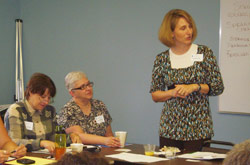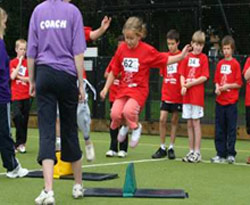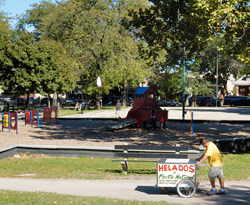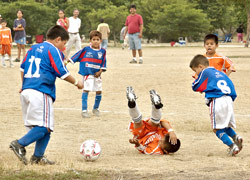Lab Research Projects
Leisure, Health and Wellness Research Lab Projects

Dr. Laura Payne
The primary focus of research projects that Dr. Laura Payne is conducting with her colleagues and graduate students is on the role of leisure
in the promotion and maintenance of health among older adults with one or more ongoing health conditions. For example, over the last several years,
they have developed and tested a multi-dimensional scale to measure leisure-based selective optimization with compensation. Take Charge of Your
Health: Live Well Be Well (TC: LWBW) is another example of a project related to this area of inquiry. This project was funded by a grant from the
USDA and the Retirement Research Foundation (RRF). TC: LWBW is an evidence-based chronic disease self-management program being implemented statewide
in Illinois through collaboration among aging network service organizations and other health and social service agencies. In addition to capacity
building and program dissemination, Dr. Payne is working with colleagues at the University of Illinois-Chicago to examine the reach, efficacy,
adoption, implementation, and maintenance of this program in Illinois using the RE-AIM framework. Moreover, with permission from Stanford University,
her UIUC Extension group has developed and is pilot testing a new leisure education program component that is added to the standard program.

Dr. Lynn Barnett Morris
The central question underlying Dr. Barnett's research is an investigation of what people derive from their participation in play and
recreational activities. This question is being approached from different perspectives and settings, and with children through young adults.
Longitudinal and cross-panel data examines children's history of engagement in out-of-school programs and activities compares their participation
patterns with their academic, social, and emotional functioning, and with their parents’ attitudes toward time use, free play, and gender-role
stereotyping. The ability of children and young adults to transform a stressful environment into one affording playful opportunities is another
approach to investigating the dynamic interaction between people and their recreational environments, focusing on the internal attributes rather
than on characteristics of their external environment. In complementary research, the use of community play structures by children through
adolescents explores how external attributes of the structure elicit specific types of social, cooperative, physical, and emotional responses.
Finally, an additional project is just beginning that identifies literature documenting the effects of recreational programs and facility use
on military personnel and their families. This research will then be utilized to provide the foundation for a computerized decision model that
can be employed by FMWR officers to aid in administrative decision-making about the allocation of resources.

Diversity Research Lab Projects
Drs. Monika Stodolska, Kim Shinew, Julie Son, and Jacqueline McDowell
Since the Diversity Lab was established in 2001, Drs. Stodolska, Shinew, Son, and McDowell conducted a number of exciting research
projects under the auspices of the DRL. For instance, in 2009-2011, along with a graduate student – Juan Carlos Acevedo and Dr. Caterina
Roman of the Temple University Drs. Stodolska and Shinew are conducting a study to examine the bi-directional relationship between crime
(fear of crime, level of crime victimization, and perceived level of disorder in the community) and physical activity participation and outdoor
recreation among Latino adolescents ages 11-14 and 15-18. The study focuses on Latino(a) adolescents residing in Little Village – a predominantly
Latino community in Chicago and consists of two components: surveys and individual in-depth interviews. The study is being funded by the Robert
Wood Johnson Foundation, Salud America Program. In 2006-2009, Drs. Shinew, Stodolska, and Gobster of USDA investigated environmental preferences
of Hispanic minority residents as they relate to physical activity. Among others, their study examined the level of perceived access minority
residents have to natural environments, the frequency with which minority residents use natural environments for physical activity, and the
specific environmental preferences of minority residents. The study consisted of three phases: surveys of community residents, focus groups
with community residents, and interviews with local stakeholders. The study was funded by the U.S. Forest Service. Members of the DRL, along
with the faculty from the Department of Urban Planning and Department of Kinesiology and Community Health were also involved in a research
project that examined the impact of sport facilities and trail systems on the utilization of urban parks, trails, and sport complexes for
 active recreation by Latino Americans. This study was conducted in two community parks in Elgin (a suburban Chicago community), in the Stuart
Sports Complex in Aurora (also a suburban Chicago community) and along Lincoln Park trails in the City of Chicago. It was funded by the Robert
Wood Johnson Foundation. Research projects conducted by members of the DRL also expand into the area of sport. For instance, in one of her research
projects, Dr. McDowell examined why racial minorities are over-represented in academic support positions, such as life skill coordinators and
academic supervisors/advisors, but under-represented in other administrative staff and senior level positions. This study explored this occurrence
with senior level administrators and academic advisors in one Division I athletic department. In another research project, Dr. McDowell investigated
the miasma (i.e. a murky atmosphere of misperceptions, stereotypes, and distortions in which many nontraditional leaders navigate) and challenges
that Black female athletic directors of NCAA Division I, II, and III intercollegiate athletic departments, experience in the workplace. Currently,
Dr. McDowell and Dr. Shinew are working to develop a program to address the low percentage of women of color in leadership positions in sport and
recreation organizations.
active recreation by Latino Americans. This study was conducted in two community parks in Elgin (a suburban Chicago community), in the Stuart
Sports Complex in Aurora (also a suburban Chicago community) and along Lincoln Park trails in the City of Chicago. It was funded by the Robert
Wood Johnson Foundation. Research projects conducted by members of the DRL also expand into the area of sport. For instance, in one of her research
projects, Dr. McDowell examined why racial minorities are over-represented in academic support positions, such as life skill coordinators and
academic supervisors/advisors, but under-represented in other administrative staff and senior level positions. This study explored this occurrence
with senior level administrators and academic advisors in one Division I athletic department. In another research project, Dr. McDowell investigated
the miasma (i.e. a murky atmosphere of misperceptions, stereotypes, and distortions in which many nontraditional leaders navigate) and challenges
that Black female athletic directors of NCAA Division I, II, and III intercollegiate athletic departments, experience in the workplace. Currently,
Dr. McDowell and Dr. Shinew are working to develop a program to address the low percentage of women of color in leadership positions in sport and
recreation organizations.
Tourism Laboratory for Economic and Social Behavior Research
Dr. Carla Santos
Dr. Santos' research program is focused on the examination of communicative practices (from mass mediated narratives to the face-to-face dyad)
as a means of addressing the socio-political and cultural impact of tourism on the world's people and cultures. Her research program contributes
to tourism literature by exposing and locating how communicative practices can facilitate high quality tourism programs and services that are
sustainable and productive in a social and cultural sense. Working with graduates students and faculty at the University of Illinois as well as
other universities, Dr. Santos is currently involved in a variety of projects that broadly explore how communicative practices shape the moment-by-moment
social actions of hosts and tourists. One of such projects examines the complex and loaded relationships of European Union heritage and tourism.
The aim of the project is to investigate the negotiation of cultural identity for tourism purposes among local settings of everyday life and
translocal administration and governance processes, in order to advance the understanding of the cultural and social legacies of tourism on the
EU. This project is funded by the European Union Center, as well as the University of Illinois Research Board. Another project she is currently
engaged in explores the creative, risk taking, and innovative nature of heritage tourism entrepreneurship. The project brings together existing
knowledge regarding the development of entrepreneurial heritage tourism cultures, the commercialization of heritage tourism products, and the
increasing significance of business networks for heritage tourism. This project is funded by the Academic for Entrepreneurial Leadership. Other
recently completed projects include: an exploration of the meanings genealogical tourists attribute to their lived experiences and a
contextualization those findings within larger social approaches to the human dynamics that drive contemporary tourism; and, an examination
of the interlocking socio-cultural intra-ethnic relationships from the on-the-job perspectives of ethnic social agents involved in selling ethnic
goods and services to tourists – in particular, Chicago's Chinatown Chinese justification of their involvement in the tourism-related project of
manipulating ethnic identity. In conducting such projects, Dr. Santos uses a variety of research tools, including interviews, focus groups,
participant observation, discourse analysis, phenomenology, and grounded theory, among others.